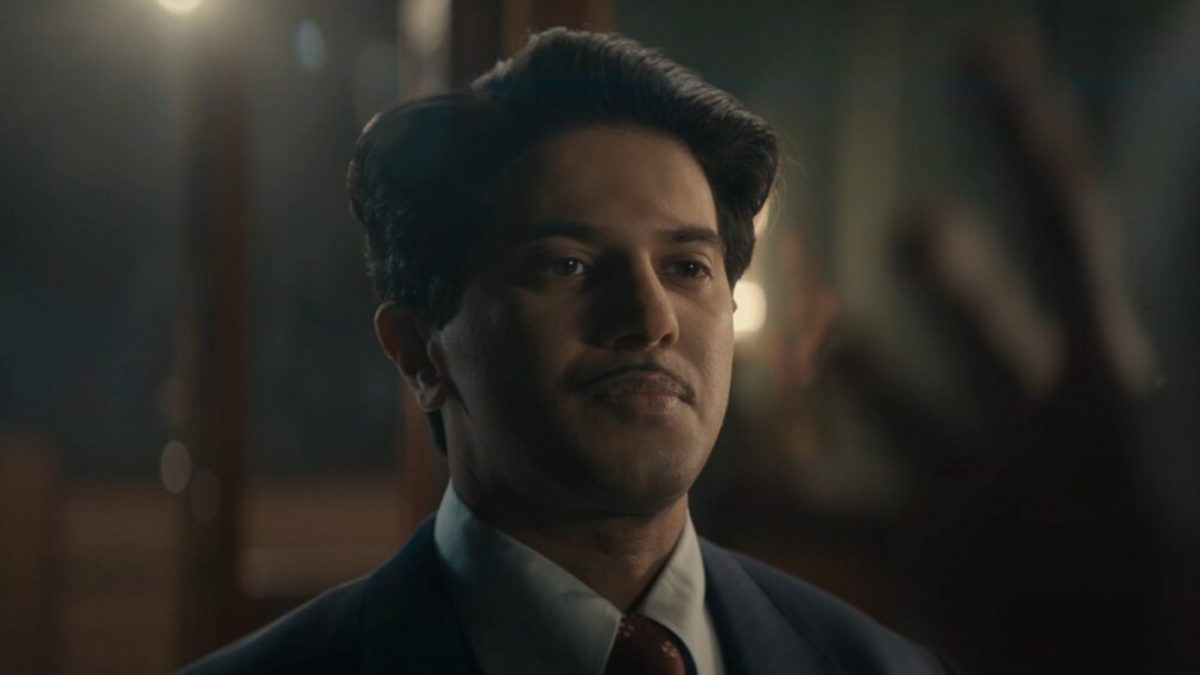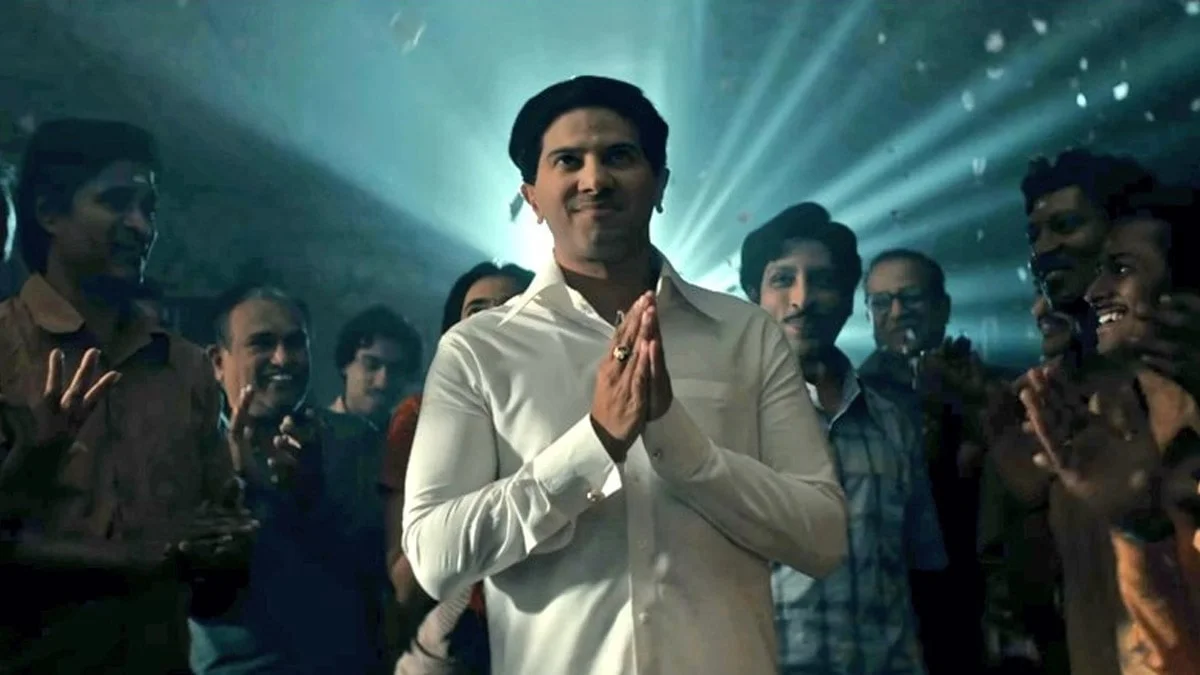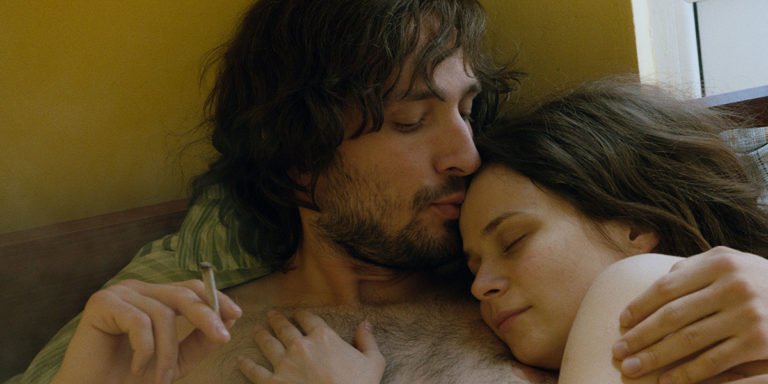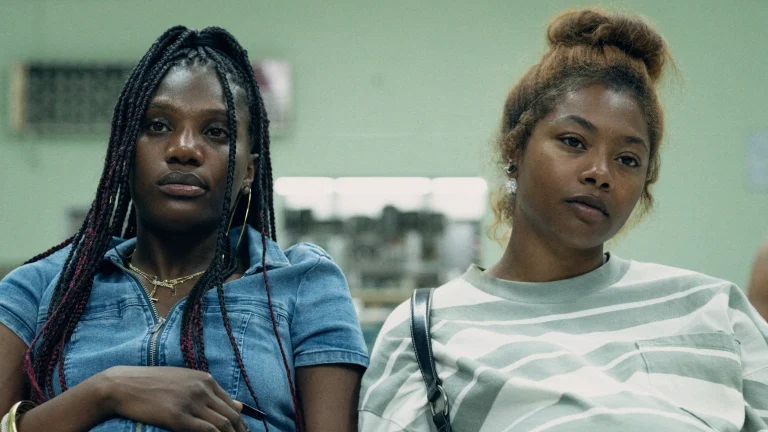In Selvamani Selvaraj’s “Kaantha,” most of the weighty discourse happens in a car, whether that’s a vintage or used as a cab, like in his 2015 directorial debut “Nila,” both stay with the key characters and metaphorically drive the film. For Selvamani, nostalgia isn’t new, but transporting the audience to a period setting of the 1950s Madras is, and he does it so well by setting the mood with a shootout that’s completely shot in silhouette, just like “Kolai,” Balaji Kumar’s film. In fact, there are so many parallels that can be drawn between how “Kolai” (2023) and “Kaantha” (2025) play with their period setting, both its silver lining and its doomy gloom.
Parallels can also be drawn in how “Kaantha” appears inspired not only by Tamil cinema’s first superstar, M. K. Thyagaraja Bhagavathar, but by several influential figures of that era who were elevated to near–demigod status for shaping the industry. Echoes of personalities such as Modern Theatres’ founder T. R. Sundaram, T. R. Rajakumari, T. R. Mahalingam, K. R. Ramasamy, P. U. Chinnappa, S. D. Subbulakshmi, and even Irish-American filmmaker Ellis Roderick Dungan can be felt throughout the film’s creative fabric.
Ravindra Vijay plays Martin, a studio head and producer of superstar TK Mahadevan’s (Dulquer Salmaan) long-awaited film titled “Saantha.” Later, the star, TKM, renames it “Kaantha” by changing just a suli (curve) in Sa to Ka, and that’s when you know there is an ego clash between the two — one is called Ayya and the other praised as ‘Nadippu Chakravarthy’ (king of acting). Martin is played in the exact metre as Matt Remick in Seth Rogen’s “The Studio,” except here he is one of the suspects in a murder.

More Related: The 10 Best Tamil Movies Of 2024
All of the characters in “Kaantha” are layered and sketched with shades of grey, even Kumari (Bhagyashri Borse), to an extent, and there is a finesse in Selvaraj’s filmmaking that you will miss in most Tamil films that try to transport you to the retro. Selvaraj has a concrete idea of when to transition to black and when to colour.
When Ayya (Samuthirakani) gets up from his director’s chair and goes on to ridicule Mahadevan for his habit of playing to the audience’s claps and changing scenes in his own way, the scene is immediately cut to a colour frame of Ayya sitting in the same director’s chair and calming himself down. A striking realization hits you that the one you witnessed is his imagination, not real, which is rendered in black-and-white to him, a shadow of his soul, reflecting a seething anger for the actor he raised, who is now playing to the gallery.
For Mahadevan, playing for the applause and pleasing audiences is his only need. He recalls his street theatre actor days, as it’s the applause that made him differentiate between the stones thrown at him and the coins with their ‘cling’ sound. For the other, being a true actor shouldn’t continue to act once the director calls cut. This is just like how Balaji Tharaneetharan played with the same idea of ‘soul’ acting in only certain films that are artistic versus their commercialisation in “Seethakaathi.” “Kaantha” deals with this same ego clash in an all-intriguing way. It handles the complex nature of the screenplay with nuance.
When Mahadevan calls the shots in the way “Kaantha” is made, he tells Kumari that until he saw her acting, he thought competition itself was unhealthy, but later found that he liked this kind of healthy competition. “Kaantha” also has a meta-reference to Neeli, a character whom “Lokah” is based on, a film produced by Dulquer himself.
When Ayya tells the reason why he is making the female-focused “Saantha” to Kumari and why it’s special to him, he says that it’s his own mother’s story who killed herself due to his alcoholic and abusive husband, which ironically parallels how their male egoism leads to the murder of an innocent soul, just like Neeli is portrayed as villainous in popular Shaivite thevaram hymns or alike in Kerala folklore. This is even echoed by Ayya’s assistant Babu (Bijesh Nagesh), who pleads to Mahadevan in the climax that if he leaves this Burmese refugee in this state, her story will be told differently, and that the film needs a release to tell this person’s tale in true form.

Also Read: From Dada to Chithha: The Ten Best Tamil Movies of 2023
“Kaantha” also makes a neat genre shift in the second half to an investigative drama that is powered by a whimsical performance by Rana Daggubati as Devaraj alias Phoenix, who investigates the crime in a meticulous and fun way, almost like solving a complex puzzle with a jingle playing along the way, just like a horror theme that plays along the final sequence in the “Kaantha” film that is being shot.
Dulquer, who has been in several retro-themed films (even playing Gemini Ganesan in “Mahanati”), plays Mahadevan, a star with ten consecutive blockbusters, with true conviction and an arresting screen presence, aided by Samuthirakani and Bhagyashri Borse, who both deliver power-packed performances.
The film’s richly detailed sets and production design not only recreate its period and atmosphere with precision but also deepen its emotional tone, beautifully complemented by Dani Sanchez-Lopez’s genre-rooted cinematography and Ramalingam’s evocative art direction. Jhanu Chanthar and Jakes Bejoy’s music mixes classical tunes with a modern twist, like the song Panimalare, which evokes a stage-play aesthetic with salsa dance.
The only gripe with the film is that it could have fleshed out the uneven dynamic between Mahadevan and his wife Devi (Gayathrie Shankar) with more depth. “Kaantha” is a visually evocative and fascinating film as it’s both genre-specific and slightly bends the genre with powerful performances from the lead actors and astute production quality that powers the period drama with Selvaraj’s finesse writing and filmmaking. It’s part meta, part cinematic, part fiction, and part real. Both “Seethakaathi” and “Kaantha” end in the same way, but here the statue, or rather the cutout, is different.







![Roobha [2019] ‘LIFF’ Review: A Living, Breathing Agony Of The Societal Trappings](https://79468c92.delivery.rocketcdn.me/wp-content/uploads/2019/06/ROOBHA-009-©Next-Productions-Canada-768x576.png)
